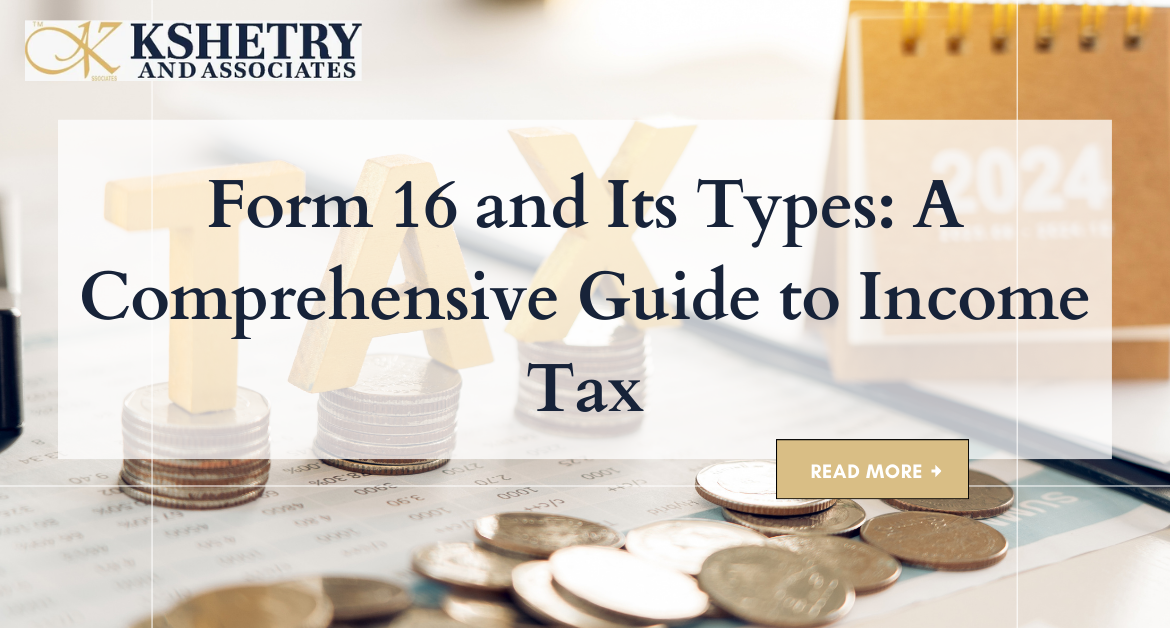Form 16 of income tax is a document provided under Section 203 of the Income Tax Act of 1961. Employers issue this certificate to their employees and act as proof of Tax Deducted at Source (TDS) related to salary income. It is provided by the employer each year before June 15th, following the conclusion of the financial year during which the income was received. It ensures that the employer correctly submits the TDS to the Income Tax Department. In simple terms, Form 16 serves as a certificate that contains a comprehensive overview of the following aspects within a specific financial year (from April to March):
- Employee’s salary
- Allowances received
- Deductions made
- Taxes paid on behalf of the employee
Structure of Form 16
Form 16 (Part A)
Form 16 (Part A) addresses TDS related to salary. Part A includes information regarding the TDS deducted from your salary and the salary paid during each quarter of the financial year.
Components of the Form 16 Part A TDS Certificate:
- Employer’s name, PAN card number, TAN number, and address.
- Employee’s name, PAN card number, and address.
- Information on tax deducted and deposited quarterly with the government.
- The assessment year for which TDS has been withheld.
- The duration of employment with the respective employer.
- The TDS payment acknowledgment number.
Form 16 (Part B)
Part B of Form 16 of income tax provides details on the calculation of taxable income and the tax owed or refundable. It also contains a breakdown of the salary paid to the employee during the financial year, regardless of whether it was from one or multiple employers, along with information on any additional income the employee has reported to the employer.
Components of the Form 16 Part B TDS Certificate:
- Detailed salary components such as HRA and any claimed deductions like PPF, NSC, pension, gratuity, leave encashment, LTA, and so on.
- Deductions are allowed according to Chapter 6A of the Income Tax Act.
- Any applicable education tax and surcharge.
- If you have held multiple jobs in one year, you will receive more than one Form 16.
- The employer is responsible for preparing Part B and providing it along with Part A.
Types of Form 16
Form 16
Form 16 of income tax is a TDS certificate provided by the employer confirming the tax deducted from the employee’s salary. It acts as evidence that tax has been withheld from the employee’s salary and submitted to the government.
Form 16A
Form 16A is a TDS certificate for non-salary-based income that is provided by financial institutions rather than the employer. For example, you will receive a Form 16A if a bank withholds TDS on your interest from a fixed deposit, TDS on an insurance commission, or TDS on rental income.
Form 16B
Form 16B is a TDS (Tax Deducted at Source) certificate issued by the buyer to the seller of an immovable property, as mandated by Section 194-IA of the Income Tax Act, 1961. When purchasing property valued at ₹50 lakh or more, the buyer is required to deduct TDS at 1% of the sale consideration at the time of payment to the seller. This deducted amount must be deposited with the Central Government within 30 days using Form 26QB. Subsequently, the buyer must provide the seller with Form 16B, which serves as proof of the TDS deduction and deposit.
The Importance of Form 16
The following aspects highlight the significance of Form 16 of income tax for employees:
- Efficient ITR Filing: The details included in Form 16 make the process of filing Income Tax Returns (ITR) more straightforward.
- Self-reliant ITR Preparation: Employees can independently prepare their ITR, reducing the necessity for financial consultants or Chartered Accountants.
- Tax Payment Verification: Form 16 assists in confirming the tax amount paid by cross-referencing it with Form 26AS.
- TDS Verification: It serves as evidence of Tax Deducted at Source (TDS) and the income earned.
Verifying Form 16
Employers issue Form 16 with a Digital Signature Certificate (DSC), typically signed by an authorized signatory. Taxpayers can verify Form 16’s validity online via the TRACES website:
- Access the official income tax portal website.
- To log in, enter your password and use your PAN as your username.
- Navigate to the TRACES webpage to verify the details of the TDS certificate.
- Verify the TDS amount, assessment year, employer TAN, and TDS certificate number.
If discrepancies arise, contact your employer to request corrections to the Form 16 or TDS certificate.
If You Don’t Receive Form 16
- Reach Out to HR: Ask your employer’s payroll department for it.
- Explore Online Portals: Numerous companies offer Form 16 through their employee websites.
- Check Form 26AS: Obtain corresponding details on the income tax website.
- Report Non-Compliance: File a complaint with the Income Tax Department if your employer does not provide it.
Practical Advice for Taxpayers
- Maintain a record of all earnings and deductions for verification purposes.
- For accurate tax filing, use Form 16 in conjunction with Form 26AS and AIS (Annual Information Statement).
- Seek advice from a tax consultant if you encounter inconsistencies or need assistance with tax planning.
Final Words
Form 16 of income tax is an essential document for the Income Tax Department as well as employees. It not only simplifies the income tax filing process but also serves as proof of income and tax compliance. Whether for tax purposes, loan applications, or employment verification, ensuring accuracy and understanding of the components of Form 16 can help taxpayers fulfill their obligations effectively. Always validate the document to avoid complications, and use it to streamline your tax filing process.
Also Read: Understanding Property Disputes and Real Estate Laws in Kolkata

